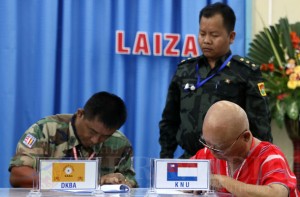Nationwide Ceasefire Accord: Not the End Game
By Burma Partnership • November 4, 2013 At a historic summit in Laiza, Kachin State, 17 ethnic non-state armed groups agreed to sign the government proposed nationwide ceasefire accord on condition that political dialogue will follow. Of the armed groups who attended this conference, the Restoration Council for Shan State (RCSS) were the only group not to sign, stating that they wanted to consult with Shan political parties and civil society before agreeing.
At a historic summit in Laiza, Kachin State, 17 ethnic non-state armed groups agreed to sign the government proposed nationwide ceasefire accord on condition that political dialogue will follow. Of the armed groups who attended this conference, the Restoration Council for Shan State (RCSS) were the only group not to sign, stating that they wanted to consult with Shan political parties and civil society before agreeing.
A 13-member committee has been formed that will lead negotiations with government minister Aung Min’s peace team in Myitkyina, the capital of Kachin State, starting on 4 November. The conditions to be negotiated with Aung Min include a guarantee that comprehensive political dialogue will be held early next year that will address the role of the Burma Army and greater autonomy for Burma’s ethnic nationalities, something for which they have been fighting for decades.
The 3-day summit was held in Laiza, a town in Kachin Independence Organization (KIO) held territory. Ethnic leaders were greeted by hundreds of supporters on the streets of the town, cheering and singing songs as various leaders arrived. It is of no surprise that ethnic armed groups garner this kind of support. As the summit was being held, Burma Army forces attacked villages in southern Kachin State, displacing around 2,000 people and causing one woman, who was already in bad health, to die while she was sheltering in a church. Burma Army soldiers reportedly opened fire as they entered the five villages under attack.
This attack comes just a few weeks after earlier talks held between the KIO and the government’s Union Peace Working Committee on 8-10 October resulted in both sides pledging to work towards reducing hostilities. But trust has yet to be achieved. While the government peace team talks peace, the Burma Army continues its offensives. This is why the condition that political dialogue must be initiated after the signing of the accord is crucial. There is no point signing a ceasefire if the aggressor ignores its contents. A political dialogue is imperative as this can lead to a reduction in the role and power of the Burma Army, an institution that has ruled Burma with an iron fist and has been the main perpetrator of human rights abuses for decades which still has a disproportionate amount of power today.
Another aspect of future peace talks that must be addressed is justice. In light of the recent report by the Kachin Women’s Association of Thailand (KWAT) that outlines continuing human rights abuses committed by the Burma Army including torture, rape, and extrajudicial killings, accountability for such acts is necessary for sustainable peace. If this issue is ignored, grievances and an underlying sense of injustice will prevail and true national reconciliation will not be achieved.
There is a danger that the Burma government’s current push for a nationwide ceasefire accord will not lead to future progress in the peace process. While the government is committed to signing, and is rushing the ethnic armed groups into this “nationwide” accord in a very public show, the most important part of the process will be comprehensive, inclusive political dialogue with all parties on an equal footing. During any peace process, a ceasefire accord of any level cannot be the end point. It is merely a beginning and the Burma government must show commitment to what will be a long political process towards achieving a sustainable peace with its ethnic nationalities for the country’s genuine democratization and development. The international community also must not see this ceasefire accord as a sign that peace is inevitable while the Burma Army continues attacking ethnic armed groups with whom they have a ceasefire agreement already agreed upon. Political dialogue will address issues that are difficult and messy, such as the power of the Burma Army, political power sharing between the central government and ethnic nationalities, resource management, and justice for human rights abuses committed by all sides. But if sustainable peace in Burma is the true goal of the Burma government, it must be willing to address these issues.
Tags: Attack, Burma Army, Burma Partnership, Dialogue, Kachin State, Peace ProcessThis post is in: Blog
Related PostsKNO’s Condemation Statement on Unprovoked Attacked at KIA’s Military Academy by the Burma Army
KIA ဗိုလ္သင္တန္းေက်ာင္းသို႔ ျမန္မာအစိုးရစစ္တပ္မွ လက္နက္ႀကီးျဖင့္ ပစ္ခတ္တိုက္ခိုက္မႈအေပၚ KIA ၏ ထုတ္ျပန္ေၾကညာခ်က္
Announcement of Treasury Sanctions Against Aung Thaung
Reform of the Police and the Judiciary is a Matter of Urgency
Burma Army Shows Contempt of Buddhism During Latest Attacks in Shan State









 All posts
All posts